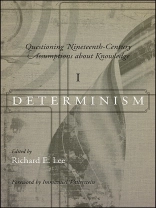During the last few decades, the fundamental premises of the modern view of knowledge have been increasingly called into question. Questioning Nineteenth-Century Assumptions about Knowledge I: Determinism provides an in-depth look at the debates surrounding the status of ‘determinism’ in the sciences, social sciences, and the humanities in detailed and wide-ranging discussions among experts from across the disciplines. A concern for the future, and how to approach it, is evident throughout. Indeed, the sense that there exists a reciprocal relationship between the structures of knowledge and human systems, including ecosystems, suggests that thinking about the possible rather than the necessary, may be a more winning strategy for our times. Weaving together in-depth articles and invigorating follow up discussions, this volume showcases debates over the status and validity of determinism. Of special interest are the impact of determinism on the perception and writing about the past; the relationship between chance and necessity in philosophy and grand opera; and the affect of determinism in mathematical modeling and economics.
表中的内容
Participants
Illustrations
Foreword
Immanuel Wallerstein
Introduction
Richard E. Lee
S E S S I O N I
Freedom and Determinism in the Twenty-First Century: Prolegomena to the Rewriting of History
Steve Fuller
Discussion
S E S S I O N I I
Mobile Order: Between Chance and Necessity
Fernando Gil
Discussion
S E S S I O N I I I
Determinism and Mathematical Modeling
Ivar Ekeland
Discussion
S E S S I O N I V
Organizers’ Opening Remarks
Immanuel Wallerstein
Jean-Pierre Dupuy: Does Determinism Entail Necessitarianism?
Discussion
Index
关于作者
Richard E. Lee is Professor of Sociology and Director of the Fernand Braudel Center at Binghamton University, State University of New York. He is the author of
Life and Times of Cultural Studies: The Politics and Transformation of the Structures of Knowledge and the coeditor (with Immanuel Wallerstein) of
Overcoming the Two Cultures: Science versus the Humanities in the Modern World-System.












